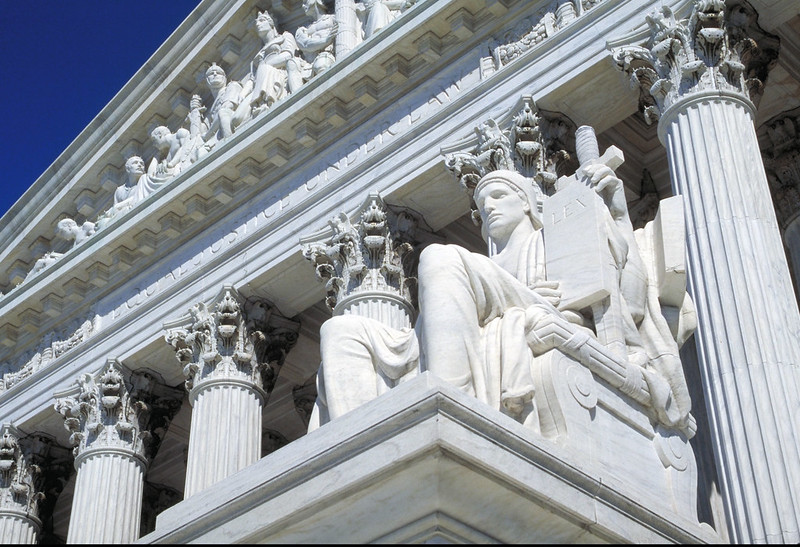
Supreme Court Watch
Argued April 22, 2024
Question Presented
Does a city’s local ordinance banning public camping violate the 8th Amendment’s prohibition on cruel and unusual punishment?Statement of Facts and Procedural History
Grants Pass is a city in Southern Oregon with about 38,000 people and a homeless population of between 50 and 600 individuals. While the exact number of homeless individuals is unknown, the population exceeds Grant’s Pass’s number of available shelter beds. Grants Pass municipal code includes anti-sleeping, anti-camping, and park exclusion ordinances, which ban these homeless individuals from engaging in such activity in public places and impose civil penalties (which can become criminal) for violating these ordinances.
This statute was challenged in court by a certified class on the basis that it violated the 8th Amendment by criminalizing the status of homelessness rather than any specific activity. In 2020, a district court ruled in favor of the plaintiffs and issued an injunction against the city from enforcing the ordinances. The 9th Circuit heard the case on appeal and affirmed the district court’s ruling in 2022 by relying on its recent precedent from Martin v. Boise. The City of Grants Pass appealed the decision to the Supreme Court, which granted cert and heard oral arguments in April 2024.
Key Precedents
- Martin v. Boise, No. 15-35845 (9th 2018)
- In which the 9th Circuit Court of Appeals held that the 8th Amendment’s prohibition on cruel and unusual punishment places substantive limits on the type of activity that the government can criminalize and, therefore, bars a city from criminally prosecuting individuals for sleeping on public property when they have no home or shelter to go to.
- Powell v. Texas, 392 U.S. 514 (1968)
- In which the Supreme Court held that criminal penalties may only be inflicted on conduct or behavior, rather than involuntary status. In Powell, the Court found that a state law prohibiting public intoxication was not precluded by the 8th Amendment, even though the defendant asserted that his chronic alcoholism amounted to a symptom of his disease rather than a deliberate choice. The Court held that the law in question did not punish Powell for his alcoholism as a condition, which the 8th Amendment would have barred, but instead punished him for his conduct of drunkenness in a public place.
- Robinson v. California, 370 U.S. 660 (1962)
- In which the Supreme Court held that a state law that imprisons a person for narcotic addiction in the absence of narcotic usage amounts to cruel and unusual punishment and is thus barred by the 8th A California jury found Robinson guilty of being addicted to the use of narcotics under Cal. Health & Safety Code § 11721 (based in part on evidence of scar tissue and discoloration in his arm) but lacked evidence of illegal conduct or actual narcotics use within the state. After the 9th Circuit affirmed the conviction, the Supreme Court overturned the conviction. It held that the statute in question made the status of being addicted a criminal offense, rather than narcotics usage itself, and was thus prohibited by the 8th Amendment.
Summary of Argument
Respondents Gloria Johnson and John Logan (as certified class representatives) argued that the city’s ordinance makes it impossible for homeless individuals to live in Grants Pass without facing punishment. In their argument, this violates the 8th Amendment’s prohibition on cruel and unusual punishment, as understood in Robinson, because it amounts to a criminalization of status rather than conduct. The respondents further argue that the city’s ordinances punish the unavoidable human behavior of sleeping and that there is no valid penological purpose. Punishing such behavior, in their view, does not meet any of the four primary penological purposes: retribution, deterrence, incapacitation, or rehabilitation. The respondents also argue that an originalist understanding would view such ordinances as cruel and unusual punishment because, during the Founding era, the homeless were often provided with food, clothing, shelter, and work opportunities through poor houses and other such intermediary institutions. The elderly, disabled, sick, or infirmed were offered special care—not imprisonment.
The City of Grants Pass offered a constitutionalist response to these claims. The city argued that the opposing counsel never attempted to “square the Ninth Circuit’s ruling or their position” with an original understanding of the Constitution. According to the City of Grants Pass, the “text, history, and tradition” of the Eighth Amendment refutes the respondent’s claim that the cruel and unusual clause’s focus on methods of punishment is obsolete.
The city further argued that without the ability to create laws to protect its public places, its hands would be tied in its ability to combat encampments and other such activities. Moreover, the city argued that Johnson’s reliance on Robinson as the basis of her case falls short because Robinson bars punishment for status rather than conduct, and it is the conduct of public camping rather than the status of homelessness at issue here. The Court has previously held that Robinson is only implicated when someone is convicted of a status crime and, therefore, does not apply. The City of Grants Pass further argued that Powell, which built on Robinson, refused to hold that some conduct cannot be punished because it is considered involuntary.
Likely Holding
With a conservative majority, the City of Grants Pass ordinances will likely be upheld, and the 9th Circuit’s holding in Martin v. Boise will likely be overturned. Justice Thomas, one of the Court’s most committed originalists, pointed out at oral argument that the law at issue in Robinson, which Johnson’s argument leaned heavily on, criminalized both the use of drugs and the state of being addicted to drugs. The ordinance in this case, however, only banned sleeping in public, rather than the status of being homeless. Justice Barrett offered an additional critique of Johnson’s argument by asking what the limiting principle to their stance would be. If a ban on sleeping in public is unconstitutional because sleep is a human necessity, then is the city also precluded from enforcing anti-shoplifting laws at grocery stores because eating food is also a human necessity? What about laws banning the use of the restroom in public, which is also a human need?
However, this case is not without its challenges, including from the perspective of the conservative justices. Justice Kavanaugh appeared dubious that allowing the law to stand would make a difference in addressing the homelessness problem. He pointed out that if there are not enough shelter beds and homeless individuals are jailed instead, when they are released, they will be in the same position as they were before. Justice Gorsuch also brought up the possibility of Johnson raising a necessity defense in response to the violation, which would allow the Court to avoid the 8th Amendment issue and potentially difficult line drawing entirely.
Finally, Justice Alito highlighted the fact that while status and conduct are different things, in some cases (such as this one), status and conduct are so closely tied that they amount to the same thing. This mirrors the primary argument made by the liberal justices, namely, that the ordinance at issue amounts to criminalization of status rather than conduct, given the intricacies of the facts at hand. Along those same lines, Justice Kagan argued that sleeping in public for those with nowhere else to go is akin to breathing in public, offering another variation of the status-based argument.
Justice Sotomayor further noted that these anti-public sleeping ordinances only apply to the homeless rather than someone who takes an afternoon nap in the park or a baby under a blanket at a picnic. In her mind, this indicates that the city is, in effect, banning the condition of homelessness rather than a behavior. Justice Jackson further argued that because sleep is a basic human need, punishing someone for sleeping amounts to cruel and unusual punishment under the 8th Amendment.
While the final holding could go several different ways, the Court’s conservative majority likely will hold that public camping ordinances do not violate the 8th Amendment’s ban on cruel and unusual punishment. Such a holding would align with an originalist’s understanding of the Constitution’s text and history. Nonetheless, the holding may be narrowed due to the justices’ concerns with redressability, line-drawing difficulties, and status versus activity distinctions. While not probable, it is also possible that the Court resolves this case by turning to a necessity defense and avoiding the 8th Amendment question entirely.

